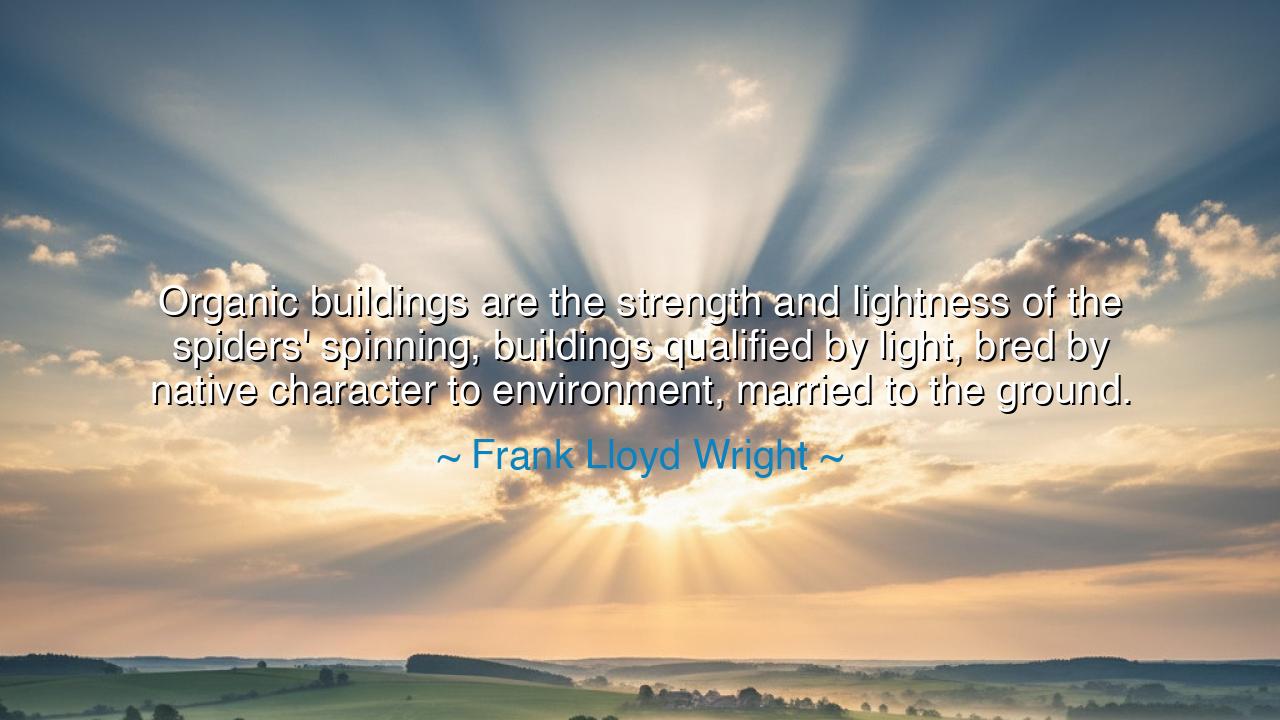
Organic buildings are the strength and lightness of the spiders'
Organic buildings are the strength and lightness of the spiders' spinning, buildings qualified by light, bred by native character to environment, married to the ground.






Hear the voice of Frank Lloyd Wright, prophet of stone and timber, who declared: “Organic buildings are the strength and lightness of the spiders' spinning, buildings qualified by light, bred by native character to environment, married to the ground.” These are not the words of a mere architect, but of a seer who looked upon creation itself and sought to bring man’s hand into harmony with nature. In his vision, a building was not a cage imposed upon the earth, but a living form, born of its surroundings, breathing with light, and anchored to the soil as a tree is to its roots.
The origin of this wisdom lies in Wright’s philosophy of organic architecture, born in the early 20th century, when cities rose in steel and concrete, often with no regard for harmony or place. Against the arrogance of towers that scarred the sky, Wright spoke of a gentler strength, one like the spider’s web—delicate in appearance, yet astonishing in power, suspended between earth and air, at once fragile and eternal. For him, the true building was not a fortress apart from nature, but an extension of it, shaped by the land and married to its rhythms.
This vision is most clearly seen in Wright’s creation of Fallingwater, the house built above a waterfall in Pennsylvania. Where others might have bulldozed the rock and tamed the stream, Wright embraced them. He wove his structure into the cascade, letting stone, water, and timber speak as one. The house does not dominate its surroundings—it seems as though it has grown out of them. In this we see the fulfillment of his words: strength and lightness combined, light flooding through open spaces, the dwelling married inseparably to the ground upon which it rests.
In this teaching lies a reflection of ancient wisdom. Consider the builders of the Parthenon, who raised marble columns upon the Acropolis not to mock the hill but to crown it. Or the dwellers of Mesa Verde, whose cliff homes merged so seamlessly with the stone that they appeared as part of the canyon itself. In all these works is the recognition that human structures achieve greatness not by defying nature, but by becoming one with it. Wright, standing in the modern age, revived this eternal law.
But there is more here than architecture; there is a parable for life. For man himself must learn to live organically—qualified by light, true to the native character of his soul, and married to the ground of his origins. Many live as alien towers, disconnected from their environment, brittle in their isolation. Yet the wise live like organic buildings: they draw their strength from the soil beneath them, allow light to shape them, and grow into forms that belong to the place where they are planted. In such a life, there is both strength and lightness, power and grace.
The lesson for us is clear: whatever we build—be it homes, communities, or even the architecture of our own lives—let it be done in harmony with its environment. Do not force yourself into forms that deny your roots; instead, let your surroundings guide your growth. Be like the spider’s web: light in touch, strong in design, delicate in appearance, yet enduring against storms. Seek to integrate, not dominate. Let light enter your soul, as it enters Wright’s buildings, shaping and enlivening all within.
Practical action follows naturally. When you create, whether in art, in work, or in relationships, ask yourself: does this honor the ground it stands on? Does it welcome light? Does it grow from its environment, or does it wage war against it? Build your life as Wright built his houses—rooted, open, and in harmony with nature. For in such building lies beauty that time itself cannot erode.
Thus, O listener, carry forward Wright’s wisdom. Do not live as a tower that denies the earth, but as an organic building, strong as stone, light as web, radiant with light, and rooted in the soil of your being. In such a life you will find not only endurance, but also grace, for you will live in unity with the world that bore you. This is the teaching of Frank Lloyd Wright, spoken not merely to architects, but to all who would build wisely upon the earth.






AAdministratorAdministrator
Welcome, honored guests. Please leave a comment, we will respond soon